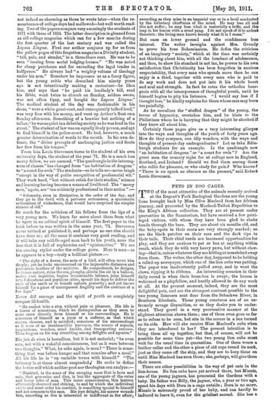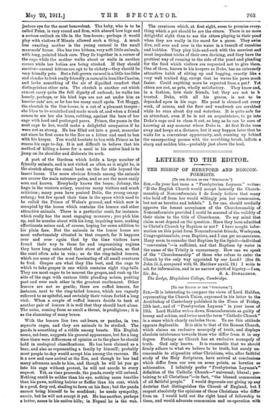PETS IN ZOO CAGES.
TWO of the most attractive of the animals recently arrived at the Regent's Park Zoological Gardens are the young lions brought back by Miss Olive Macleod from her African journey, and presented by the Macleod-Talbot Expedition to the King's African collection. They are at present under quarantine in the Sanatorium, but have received a few privi- leged visitors, with whom they have been glad to shake hands through the bars. They are about six months old, and the baby-spots in their coats are very strongly marked ; so are the black patches on their ears and the dark tips to their tails. Their chief needs are increased opportunities for play, and they are anxious to pat or box at anything within reach, which they do with very heavy paws, but without claw- ing—that is, unless whatever they are hitting at is snatched away from them. The writer, the other day, happened to be holding a rolled-up newspaper, which one of the lion cubs was patting. The paper was inadvertently pulled away, and in went the claws, ripping it to ribbons. An interesting occasion in their daily round is when their loose-box is swept; the broom is welcomed as a playfellow, and hardly allowed to do any work at all. At the present moment, indeed, they are the most delightful pets, and are the strongest contrast possible to the two young lionesses next door from the Sebackwe River, in Southern Rhodesia. These young creatures are of an ex- tremely savage disposition, or so they desire you to under- stand. They growl in a very provocative manner at the slightest attention shown them; one of them even goes so far as to refuse to be seen, but sits in the corner in a box turned on its side. How will she receive Miss Macleod's cubs when they are introduced to her? The present intention is to bring them all up together, but that, of course, will not be possible for some time yet—the two young lion cubs must wait for the usual time in quarantine. One of them wears a leather collar and the other a piece of old rope round its neck, just as they came off the ship, and they are to keep these on until Miss Macleod has seen them; she, perhaps, will give them their names.
There are other possibilities in the way of pet cats in the lion-house. No lion cubs have yet arrived there, but Minnie, one of the young jaguars, has presented the Gardens with a baby. Its father was Billy, the jaguar, who, a year or two ago, spent his days with Dora in a cage outside ; Dora is no more. Minnie is extremely proud of her baby, and can hardly be induced to leave it, even for the grisliest morsel. She has a
jealous eye for the most benevolent. The baby, who is to be called Peter, is very round and firm, with absurd bow legs and a serious outlook on life in the lion-house; perhaps it would play with visitors if Minnie allowed such a thing. A much less exacting mother is the young caracal in the small mammals' house. She has two kittens, very soft little animals, with long, pointed black ears. They lie together in a corner of the cage while the mother walks about or waits in another corner while her babies are being stroked. If they should survive—caracal kittens are apt to be rickety—they should be very friendly pets. But a full-grown caracal is a little too lithe and slender to look really friendly; a caracal is leanlike Cassius, and lacks something of the air of dignified comfort that distinguishes other cats. The cheetah is another cat which cannot carry quite the full dignity of cathood ; he walks too loosely, perhaps, or his hind legs are not set under him as heavier cats' are, or he has too many small spots. Yet Meggy, the cheetah in the lion-house, is a cat of a pleasant temper : she likes to be scratched and made much of, and when a friend comes to see her she leans, rubbing, against the bars of her cage with loud and prolonged purrs. Prince, the puma in the next cage to her, would make a delightful companion if he were not so strong. He has filled out into a great, muscular cat since he first came to the Zoo as a kitten and used to box with his keeper. You would hesitate to box with Prince as be roams his cage to-day. It is not difficult to believe that his method of killing a horse for a meal in his native land is to jump on its shoulder and dislocate its neck.
A part of the Gardens which holds a large number of friendly animals, and is not visited as often as it might be, is the stretch along the canal bank on the far side beyond the insect house. The more obvious friends among the animals are nearer the main entrance gates, and so are the more easily seen and known. Everybody knows the hears; Johnny, the kagu in the western aviary, receives many visitors and much criticism ; many pens have praised Delia, the young orang- outang; but few spend their time in the space which used to be called the Prince of Wales's ground, and which now is occupied by the house which contains the lemurs and other attractive animals. There is a particular coati, for instance, which really has the most engaging manners ; you pick him up, and he nuzzles about with his long, inquiring nose, making affectionate noises and, of course, hoping for some addition to his plain fare. But the animals in the lemur house are most unfortunately situated in that respect, for it happens over and over again that by the time visitors have found their way to these far and unpromising regions they have long exhausted their store of provisions, so that the coati often asks in vain ; so do the ring-tailed lemurs, which are some of the most fascinating of all small creatures to feed. Grapes are what they like best, and the cage to which to take grapervis one which contains eight ring-tails. They are most eager to be nearest the grapes, and rush up the side of the cage with curious little pleading noises, pushing past and over each other in the greatest excitement. Other lemurs are not so gentle; there are ruffed lemurs, for instance, next to the ring-tailed lemurs, which are vaguely referred to as spiteful, and certainly their voices forbid a long visit. When a couple of ruffed lemurs decide to bark at another pair of lemurs it is well that they should bark alone. The noise, coming from so small a throat, is prodigious ; it is as the slamming of many boxes.
With the lemurs live two cat-bears, or pandas, in two separate cages, and they are animals to be studied. The panda is something of a riddle among beasts. His English name, cat-bear, suggests his general appearance, but fora long time there were differences of opinion as to the place he should hold in zoological classifications. He has been claimed as a bear, and also as representing a family by himself ; probably most people to-day would accept him among the racoons. He is a new and rare arrival at the Zoo, and though he has had many advances made to him, and though he will let you go into his cage without protest, he will not accede to every request. Yet, as time proceeds. the panda surely will unbend. Nothing could be milder than his eye, nothing more bearlike than his paws, nothing hairier or fluffier than his coat, which is a good, deep red, shading to fawn on his face ; but the panda cannot bring himself to be confident; he needs sympathy, surely, but he will not accept it yet. He has another, perhaps a better, name in his native hills; in Nepaul he is the wah.
The creatures which, at first sight, seem to promise every- thing which a pet should be are the otters. There is no more delightful sight than to see the otters playing in their pond when they are really in the mood for a game. They swim dive, roll over and over in the water in a tumult of sunshine and bubbles. They play hide-and-seek with the merriest and most impudent tricks of their own devising, and they have the prettiest way of running to the aide of the pond and pleading for the food which visitors are requested not to give them. One of them, known to his keepers as Duke, has an extremely attractive habit of sitting up and begging, exactly like a very well trained dog, except that he waves his paws much faster. Could anything more be expected from a pet P Yet otters are not, as pets, wholly satisfactory. They know and, in a fashion, love their friends, but they are not to b trusted. Duke, with all his graces, is not to be depended upon in his cage. His pond is cleaned out every week, of course, and the floor and woodwork are scrubbed while be runs about dry and waterless. It is quite safe for an attendant, even if he is not an acquaintance, to go into Duke's cage and to clean it out, so long as he can be sure of knowing at any moment where Duke is. At first Duke runs away and keeps at a distance, but it may happen later that he waits for a convenient opportunity, and, running up behind the unsuspecting person with the scrubbing brush, inflicts a sharp and sudden bite—probably just above the heel.









































 Previous page
Previous page